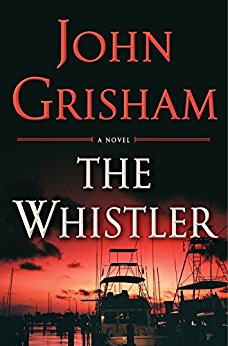
The Whistler by Jon Grisham (2016. Doubleday. 9780385541190. This review refers to the Audible version of the novel.)
John Grisham sells more books in a minute than I sell in a year. There. My envious nature is proclaimed and we can all breathe a bit easier that this judge, a real judge, one who’s on the ethical up-and-up, has made full disclosure. On to the review.
I agree with the negative reviews posted on Amazon: This book starts out with great promise but like an unattended campfire in a driving rain, slowing smolders and then dies. There is no there, there. No sizzle; only fizzle. Lacy Stoltz, the latest in a long ling of lawyer protagonists drawn by the author over an extended career, is the main focus of the story. She’s not a trial lawyer (Grisham’s usual heroes and heroines) but a lawyer turned investigator for the Florida Board on Judicial Conduct. Her job, and the job of her partner, Hugo Hatch, is to police and recommend discipline for wayward judges. And this plot has a doozie of a bad jurist: Claudia McDover, a woman in bed with both a local Indian tribe and a group of white dudes known as the Coast Mafia. There’s corruption, greed, skimmed cash, offshore accounts, burner cell phones and a pile of dead bodies incorporated into this tale of woe and deceit; all of which are so predictable and Grishamesque that the narrative ends up being a parody of the author’s better, earlier work. Plus, as countless other citizen critics have pointed out on Amazon and Goodreads, there is a guy rotting in prison for a murder he didn’t commit whose innocence, while repeatedly referenced and framed in the storyline, never gets addressed to the readers’ satisfaction. But there’s more…
If I was a Native American (Grisham’s characters use the term “Indian” saying the tribes prefer that nomenclature; that’s not been my experience but I’ll cut him some slack here), I’d be pretty pissed off at the way a white boy from privilege (the author) depicts Native American gaming and tribal life and politics. Other than the tribal constable, who eventually assists Lacy in her quest to bring down the judge and her cohorts, every other Native in this story is a bad dude. The reflections of tribal organization and politics, the fact that much of what happens on a reservation is based upon family and old wounds, while having grains of truth, do tribes that have used gaming to lift themselves out of poverty without demonstrable corruption, a disservice. I know that, in the past, say two decades or more ago, there were elements of organized crime tied to Native gaming. I am not certain such ties exist today.
And then there is the plot. As stated, one major plotline, the wrongfully convicted prisoner on death row, goes nowhere. Other bits and pieces of Lacy’s journey are staid, boring, uninteresting and just plain dull. Once Hugo meets his fiery end (spoiler alert) early on in the story, there’s really nobody to carry the plot forward who’s very intriguing or unique. In fact, the story churns along, word after painful word, mimicking the FBI-heavy story boards of Grisham’s more respected work until thankfully, it’s over. Except that it’s not. In a long-winded Epilogue, the author spends much time explaining what we just read or heard. This need for clarification and revelation after the action has stopped is, to me, a major sign that we are reading or listening to an early draft of a Grisham novel; not the polished art of a master storyteller.
In the end, I have to agree with those readers who panned this book and placed it at the bottom of Grisham’s legal thrillers. It isn’t The Firm or a Time to Kill or The Rainmaker, my favorites, and doesn’t come close to his average work like Runaway Jury or The Pelican Brief. The NYT gave this book high marks (see the review at: https://www.nytimes.com/2016/10/27/books/review-john-grishams-the-whistler.html?_r=0) so who am I to criticize, right? If you want to part with your hard earned cash, feel free. But don’t say I didn’t warn you.
2 and 1/2 stars out of 5. Not a worthy effort from a guy who once knew how to craft a story.
Peace.
Mark
PS The title refers to the fact that Lacy becomes embroiled (that’s the wrong word since the plot doesn’t boil or broil or roll but simply steeps) in the case of Judge McDover due to the involvement of someone “in the know” blowing the whistle on the judge. As a trial court judge I figured out who that mysterious blabber mouth was, without he or she being introduced to the plot, in short order. There wasn’t much suspense for me when that person’s identity was later revealed and I was proven right.


